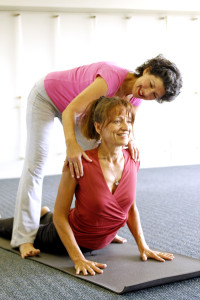
Susan assisting a student
By Susan Grbic, Growing Younger
So many younger people are taking to yoga these days, as opposed to forty years ago when I was cutting my teeth as a student and yoga was still considered way too esoteric for your average citizen.
Nowadays there’s a dizzying confusion of yoga ‘styles’ to choose from.
And precisely because yoga is attracting so many young people, hundreds of young yoga teachers are emerging.
I started teaching when I was forty-five, pretty old by today’s yoga teacher standards.
So how do I manage to compete with the flood of younger teachers? All of whom may well be able to bend and stretch and pivot and hold and reach rather better than me?
Do I still have what it takes? Am I still relevant? Do students want older yoga teachers?
I guess the answer is some do and some don’t. It all depends on why the student is practicing yoga.
If a student has not yet dug deep and is still ‘doing yoga’ as a form of exercise like many beginners, then chances are they’ll want a yoga teacher who’s a little more spicy than me. Check out the hot and sweaty classes, the power classes, the Astanga classes – they’re full of young (and wannabe young) students.
There’s no way I can compete with those kind of classes.
My teaching can only reflect my own practice if it is going to be ‘true’, and over the years my practice has become less complicated, less physically demanding, less strenuous.
It’s much more about the breath, the mind, meditation and the notion that yoga is a twenty-four hour a day practice rather than simply the hour or two we spend on the mat.
But send me the student who needs a bit of therapeutic yoga for their back pain, or the one who suffers from anxiety or depression or is simply overworked and stressed.
Send me the student who understands that yoga is a way of life.
This is where the older yoga teacher often shines.
Our years of experience have taken us from where we thought we knew everything (or at least we felt as though we needed to convey this notion to our students) to where we realize that in fact we know very little.
But what we do know we have learned through personal experience, so that knowing is deep and certain.
Aging is a gift that not all of us are handed, and as such, it is a time to be treasured and exploited to the fullest.
Our priorities change.
We can see that life is far less serious than we thought it was.
We learn (hopefully) to take ourselves less seriously too.
We begin to understand that it’s not all about ‘What’s in it for me?’ but rather ‘How may I be of service?’
We can say with certainly ‘This too shall pass’, for we have seen this to be true over and over again.
We begin to understand that life is about joy and loving and being happy with the simple things. And that if we want to be happy we need to look within. We need to find that place where happiness abides.
And then we can invite all our students to take their own journey with us.
About Susan Grbic:

Susan began teaching yoga in 1996, her early training being in Integral and then Iyengar yoga.
She opened the Albany Yoga Room in 2000, then in 2012 left to develop Growing Younger.

This is a great article by Susan Grbic. It’s no surprise that every living thing grows older, minute by minute, but when does “young” become “old” – at what particular point in the process of life does this transition take place? This of course is a foolish question – it’s a journey to be embraced as it is happening. Older teachers were once younger teachers even if as beginner teachers they were “old”. I was in my early 60’s when I began my Teacher Training and 5 years later I am still teaching. I find that NOT being able to do a perfect text book pose can be a positive teaching aid – as you can describe the intention and engagement, the process rather than just struggling towards the end result. (if indeed there is an end result) Yes yoga resonates in all we do, not just on the mat.
Thanks Kay – I love that enquiry about when does ‘young’ become ‘old’ which reminded me of that very true old saying ‘You’re only as old as you feel” – so if we never FEEL old ……….. 🙂 Also the idea that not being able to do the perfect pose being a positive when teaching – I absolutely agree! In fact I’ve learned more from injuries I have had over the years than any other way.
This is just beautiful. “Give me the student who understands yoga as a way of life.” Shouldn’t we all aim to be that student? Thank you. Thank you. Thank you.
And thank YOU Laura – lovely to know this hit a chord 🙂
What an amazing lady! I’m just starting out on my yoga journey at age 50, teacher training next year! I believe that at this particular stage of our lives we do have so much to offer our students. Yes, we may not be able to go as deeply into poses but our understanding of the more mature persons body enables us to better understand the restrictions and resistance of our bodies and how we can help to strengthen and find release throughout our yoga practice. I can’t wait to start teaching all ages and abilities!
Hi Karen – thanks for the lovely response. One of the best things about yoga is that we can start at literally any age. And one of the most heart-warming experiences one can have as a teacher is to watch the transformation that occurs when an older student gets really hooked in and starts to see life, and themselves, in a whole new light.
I feel that this article is really divisive and dismissive of the many talents of a variety of teachers and their diverse methods. It asks readers not to consider the benefits of an older teacher, but to simply believe that the age of the teacher determines that s/he is “often the best.” This promotes the false assumption that age equals wisdom, and youth equals shallow, sophomoric attitudes. It perpetuates ageism in both directions.
In terms of any sort of study — lifestyle or otherwise — it is not the age of the person teaching that matters, so much as the teacher’s experience in the practice and teaching of the study. This is not a function of age, but of time.
As such, a person can come to yoga later in life, study and practice it diligently, but may be far less experienced overall than a person who came to yoga younger in life, studied and practiced it diligently for more years than the older counterpart.
Beyond this, I like to define what makes a good yoga teacher specifically. A good yoga teacher is one who teaches safe, effective classes, grounded in experience and the tradition of yoga. A good yoga teacher transmits yoga from teacher to student.
In this way, there is no “best” teacher per se. Best is determined another way. The best teacher is determined by the student.
You can line up 10 amazing, good, yoga-transmitting teachers — with diverse ages, back grounds, methods, traditions, life experiences, races, etc — and each one will be “the best” teacher for the students who are attracted to them.
Compare, for example, myself and the teachers whom I have trained. All of them have less experience than I have. Yet, every one of them is a good teacher, and when I attend their classes, they are the best teacher for me in that moment. Some are older than me. Some are younger. Most of them haven’t been doing yoga as long, nor teaching as long. But they are still the best teacher for me — their student — in that moment.
Likewise, I will be visiting my long-time teacher — who is over 80 now, having been a yoga teacher since before I was born — very soon. She was the best yoga teacher when I first met her, and when I go and study with her again later this month, she will be the best yoga teacher again. Not because she is 80-whatever, but because I am her student. Therefore, she is the best.
But likewise, she has asked me to take her through some of the things that I’ve learned on my journeys. I, the lowly 37 yr old with far less experience in yoga. She knows that I am bringing her good things. And in that moment, I will be the best yoga teacher for her.
Often, the best yoga teacher is the person right in front of you, the person with whom you choose to study and practice. And if we keep an open mind about that, then we can receive from anyone a beautiful transmission of yoga.
Hey Jennifer – I appreciate what you are saying but need to begin by jumping to my own defence. I couldn’t work out why you often made reference to ‘the best’ teachers as I had never actually thought that I was implying that older teachers are the best teachers. Then I read the title of my article! Ooops! But it was Kara-Leah who wrote the title, not me! 🙂
I totally agree with your definition of what a ‘good’ yoga teacher is and I also acknowledge that in many cases the ‘student teacher’ attains greater heights than their own teacher. This is in fact the mark of a really great teacher – one who can be the bow from which an arrow flies straight and true.
All I was really trying to put across was that, with age (and time and life experience) , I have come to understand yoga in a far more holistic way and feel that I’m a better teacher now than I was all those years ago, even though I no longer practice (or teach) backbend drop-overs or middle-of-the-room forearm balances.
Hey Jenifer,
Yes – Sue is correct. I’m the one who came up with the headline. I don’t think the article is divisive or dismissive – Sue points out it’s her experience and life experience which shapes her as a teacher, not that age makes a person a better teacher by right.
As for the headline – headlines are about attracting interest and starting conversations, so sometimes they make a statement which may or may not be true – something which is then explored in the article and allows the reader to make up their own mind. Yet for form and styles sake, it doesn’t always make sense to frame the headline as a question – it’s much stronger to make a definitive statement, and then let the article explore that statement, with further depth added by comments. Like this comment thread. Perfect!
thanks for this! At 45 I was so surprised to be one of the oldest in my teacher training just completed. Was also the first time I ever felt that I was treated as old too-worked for this for years and was a lil disappointing to feel so left out. Most in class had only a yr or two of practice, and not a daily one. Dont like to judge but felt requirements should have been more, felt studio wanted to make $. this post cheered me up lots thank you
Hey Katrina,
Wow – really interested to hear of your experience in teacher training. I’d hardly call 45 old!!! Especially not in yoga…
You raise an interesting point too about the requirements for TT – that’s something I hope to address in a future article on the website. Stay tuned!
Hi Katrina
Firstly thanks for the ‘cheering up’ remark – I’m very glad of that. And I fully understand your frustration.
It’s wonderful of course that so many young people are now taking up yoga – but in many cases what they are being taught is nothing but the bare bones of an age-old art and science of life. And because of this superficiality they assume there’s nothing much to teaching yoga! And studios cash in.
As ‘older’ teachers all we can do is be there for those who will listen so we can share with them everything we have learned through our years of experience – both on and off the mat. 🙂